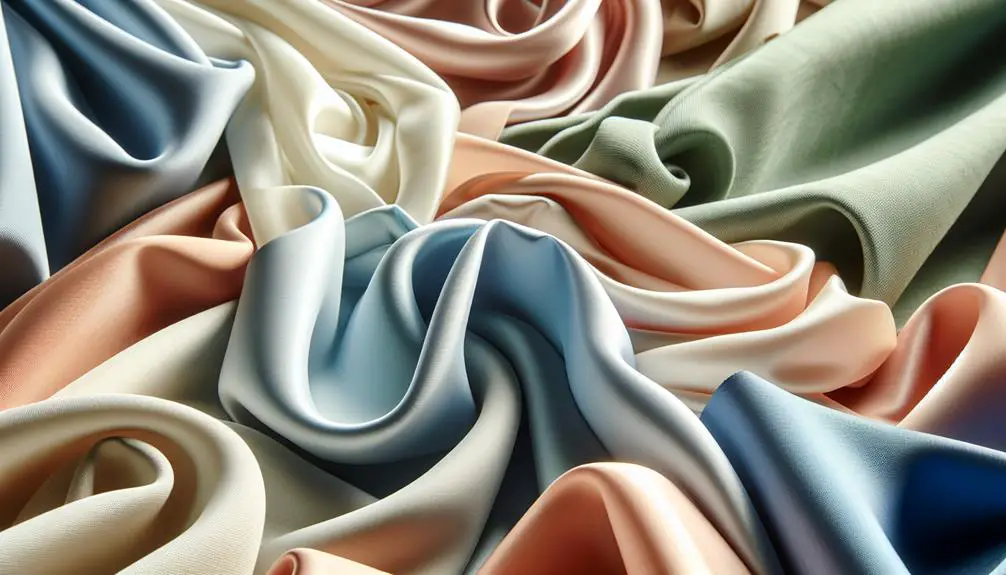Have you ever wondered if certain fabrics can genuinely alleviate skin sensitivity issues? When selecting hypoallergenic materials, you might want to explore options like organic cotton, bamboo fabric, silk, and linen. Each of these fabrics claims to offer distinct benefits for sensitive skin, from allergen-free properties to temperature regulation and eco-friendliness. But do they live up to the hype? Let's delve into these fabrics in detail, revealing why they might be the best choices for your skin and how they compare to each other.
Table of Contents
Key Takeaways
- Organic cotton offers allergen-free, breathable clothing ideal for sensitive skin.
- Bamboo fabric is hypoallergenic and temperature-regulating, providing comfort for sensitive skin.
- Silk is hypoallergenic and resistant to dust mites, mold, and mildew, ensuring skin safety.
- Linen's hypoallergenic and moisture-wicking fibers make it suitable for sensitive skin.
- Tencel (Lyocell) is a natural, moisture-wicking fiber with eco-friendly production, perfect for sensitive skin.
Organic Cotton
Organic cotton is a great option for those with sensitive skin. You'll appreciate its hypoallergenic properties, which make it ideal for avoiding irritations and allergic reactions.
Organic cotton benefits go beyond just being gentle on your skin; it's also produced through sustainable farming practices. This means no harsh chemicals or pesticides are used, making it even safer for your skin and better for the environment.
When you opt for allergen-free clothing made from organic cotton, you're not only prioritizing your comfort but also supporting a healthier planet. Sustainable farming techniques guarantee that the soil remains fertile and the ecosystem stays balanced. This leads to a cleaner product that's less likely to cause any negative skin reactions.
You don't have to compromise on style either. Organic cotton garments come in various designs and can be just as stylish as their conventional counterparts. The soft, breathable nature of organic cotton makes it an ideal fabric for everyday wear, providing you with both comfort and peace of mind.
Bamboo Fabric
Another fantastic option for those with sensitive skin is bamboo fabric. This remarkable material offers a plethora of benefits that make it a top choice. Here are three reasons why you'll love bamboo fabric:
- Hypoallergenic: Bamboo fabric is naturally hypoallergenic, making it perfect for sensitive skin. It's gentle and won't cause irritation or allergic reactions.
- Temperature Regulating: Bamboo fabric is breathable and moisture-wicking. It keeps you cool in the summer and warm in the winter, guaranteeing comfort year-round.
- Sustainability: Bamboo is one of the most sustainable resources available. It grows rapidly without the need for harmful pesticides or fertilizers, making it an eco-friendly option.
To maximize the benefits of bamboo fabric, proper care and maintenance are essential. Always wash bamboo textiles in cold water on a gentle cycle to maintain their softness and durability.
Avoid using bleach or fabric softeners, as they can damage the delicate fibers. Instead, opt for a mild, eco-friendly detergent.
Finally, air drying is your best bet to maintain the fabric's integrity, though tumble drying on low heat is acceptable if necessary.
Silk
Silk provides a luxurious and gentle choice for those with sensitive skin, blending sophistication with hypoallergenic properties. You'll see that silk benefits encompass its naturally soft texture, which minimizes irritation and rubbing against your skin.
It's also breathable, allowing air to flow, keeping you comfortable in summer and cozy in winter. Silk's hypoallergenic quality means it's resilient to dust mites, mold, and mildew, making it perfect for individuals prone to allergies or skin sensitivities.
Regarding silk maintenance, it demands a bit of care to uphold its flawless condition. You should hand wash silk in cold water using a gentle detergent or choose professional dry cleaning. Avoid twisting silk to prevent harm; instead, delicately press out excess water with a towel and lay it flat to dry.
When delving into silk fashion, you'll observe its timeless charm in everything from opulent evening dresses to graceful scarves. Current silk trends showcase its adaptability, with designers integrating silk into everyday wear, loungewear, and even bedding.
Embracing silk in your wardrobe not only enhances your style but also safeguards and pampers your skin.
Linen
Linen stands out as a natural, breathable fabric that's perfect for keeping your sensitive skin cool and comfortable. As a hypoallergenic material, linen offers several benefits that cater to those with delicate skin. The fabric's natural fibers wick away moisture, ensuring that you stay dry and irritation-free, even on hot days.
By choosing linen, you're not only making a choice for your skin but also embracing sustainable fashion, since linen is derived from the flax plant, which requires fewer resources than other crops.
To truly appreciate linen, consider these key points:
- Comfort: Linen's lightweight nature and breathability make it a joy to wear, especially during warmer months.
- Durability: This fabric is known for its strength, becoming softer and more comfortable with each wash.
- Eco-Friendliness: Linen's sustainable production process helps reduce your environmental footprint.
When it comes to linen care, remember to wash it in cold water and avoid harsh detergents to maintain its integrity. For styling tips, embrace linen's natural wrinkles and pair it with simple, elegant pieces for a timeless look.
With the right care and styling, linen can become a staple in your wardrobe that supports both your skin health and sustainable fashion goals.
Tencel (Lyocell)
You'll appreciate Tencel (Lyocell) for its natural fiber composition that's gentle on sensitive skin.
It's also excellent at wicking away moisture, keeping you dry and comfortable.
Plus, Tencel's eco-friendly production methods make it a sustainable choice.
Natural Fiber Composition
Tencel (Lyocell)'s natural fiber composition makes it an excellent choice for those with sensitive skin. Derived from sustainably sourced wood pulp, Tencel's production process prioritizes fabric sustainability and minimizes environmental impact. You can feel good about selecting Tencel, knowing it's produced using eco-friendly methods and renewable resources.
Tencel's ethical production standards guarantee that the fibers are sourced responsibly, contributing to a positive environmental footprint. This fabric is created through a closed-loop process, where solvents are recycled with minimal waste and emissions. Such practices not only safeguard the environment but also produce a high-quality, hypoallergenic fabric perfect for your sensitive skin.
Consider these emotional benefits of selecting Tencel:
- Peace of Mind: You're supporting a fabric with a low environmental impact, reducing your carbon footprint.
- Ethical Assurance: Feel confident knowing your fabric is sourced and produced responsibly.
- Comfort and Care: Enjoy the gentle touch of Tencel on your skin, free from irritants.
Mastering the art of choosing the best hypoallergenic fabrics starts with understanding the impact of their production. Tencel's natural fiber composition is a stellar example of how sustainable practices and ethical sourcing can create a fabric that's both kind to your skin and the planet.
Moisture-Wicking Properties
Thanks to its unique structure, Tencel (Lyocell) excels in wicking moisture away from your skin, keeping you dry and comfortable. This fabric boasts quick drying technology, ensuring that sweat and moisture are swiftly transferred away from your body. As a result, you'll experience less skin irritation and discomfort, making it an excellent choice for those with sensitive skin. Tencel's ability to regulate temperature effectively means you stay cool in the heat and warm when it's cooler, providing an ideal microclimate for your skin.
Moreover, Tencel's anti-odor properties are a game-changer. By inhibiting the growth of bacteria that cause unpleasant smells, this fabric guarantees you feel fresh throughout the day. This feature is particularly beneficial if you have sensitive skin, as it reduces the chance of irritation caused by bacterial growth. The smooth fibers of Tencel also contribute to preventing skin irritation, offering a gentle touch that's perfect for those prone to allergic reactions.
Incorporate Tencel into your wardrobe, and you'll notice a significant difference in comfort and skin health. Its advanced moisture-wicking properties and inherent benefits make it a top contender in hypoallergenic fabrics.
Eco-Friendly Production Methods
One of the standout features of Tencel (Lyocell) is its eco-friendly production process, which sets it apart from many other fabrics. If you're passionate about sustainability, you'll appreciate how Tencel's manufacturing aligns with your values.
From start to finish, Tencel employs sustainable practices and ethical sourcing, ensuring that the wood pulp used is harvested from responsibly managed forests.
Here's why Tencel's production process will resonate with you:
- Sustainable Practices: The closed-loop process recycles water and solvents, reducing environmental impact and conserving resources.
- Ethical Sourcing: Only sustainably managed forests provide the wood pulp, ensuring minimal ecological disruption.
- Non-Toxic Dyes and Minimal Waste: The fibers are dyed with non-toxic dyes, producing minimal waste and ensuring a cleaner textile.
Hemp
When considering hypoallergenic fabrics, you should look into hemp for its natural antimicrobial properties.
It's breathable and durable, making it ideal for sensitive skin.
Plus, hemp fabric helps keep you comfortable and irritation-free throughout the day.
Natural Antimicrobial Properties
Hemp naturally fights off bacteria, making it a top choice for hypoallergenic fabrics. You'll appreciate the benefits of natural fabrics like hemp if you have sensitive skin. Its inherent antimicrobial properties help reduce the risk of skin irritation and infections, ensuring that you stay comfortable and healthy.
To get the most out of your hypoallergenic fabric, care tips are essential. Keeping your hemp garments in top condition involves minimal effort but offers maximum reward. Here's why you'll love hemp:
- Less Laundry Stress: Hemp's antimicrobial nature means fewer washes, saving you time and energy. Imagine skipping the constant cycle of washing and rewashing.
- Long-Lasting Freshness: You'll enjoy fresh-smelling clothes longer, reducing the need for chemical-laden fabric fresheners.
- Eco-Friendly Impact: By choosing hemp, you're making a sustainable choice that's gentle on the planet while protecting your skin.
Mastering the use of hypoallergenic fabrics starts with understanding their unique properties. Hemp, with its natural ability to fend off bacteria, stands out as a superior choice. It's not just about comfort; it's about investing in your well-being and the environment.
Breathable and Durable
Thanks to its unique fiber structure, you'll find that hemp fabric offers exceptional breathability and durability, making it ideal for sensitive skin. When considering fabric choices for those prone to allergic reactions, you can't overlook hemp. Its natural fibers allow air to circulate freely, reducing moisture and keeping your skin dry and irritation-free. This breathability is vital for anyone with skin sensitivity, as it helps prevent the buildup of sweat and bacteria, which can trigger allergic reactions.
Moreover, hemp's durability means it withstands frequent washing and wear without breaking down. If you've been frustrated by fabrics that lose their integrity quickly, hemp will be a game-changer in your fabric selection process. It's not just a sustainable choice; it's a practical one for maintaining both your wardrobe and your skin health.
Here's a quick comparison to help you understand hemp's benefits:
| Feature | Hemp Fabric Benefits |
|---|---|
| Breathability | High |
| Durability | Excellent |
| Moisture Control | Superior |
| Allergic Reactions | Reduces risk |
Embrace hemp fabric to enjoy these advantages and maintain a hypoallergenic wardrobe that supports your sensitive skin. By choosing hemp, you're not just making a fashion statement but prioritizing your skin's health and comfort.
Merino Wool
Merino wool offers an exceptional blend of softness and breathability, making it a top choice for those with sensitive skin. One of the remarkable Merino wool benefits is its hypoallergenic properties, which notably reduce the risk of skin irritation. Unlike traditional wool, Merino fibers are incredibly fine and gentle, ensuring you're comfortable all day.
Additionally, Merino wool is a champion of sustainable fashion, as it's a natural, renewable resource that's biodegradable.
When winter arrives, Merino wool becomes indispensable. It provides superior insulation while remaining lightweight, making it perfect for winter wear. Picture yourself wrapped in warmth without the bulk—pure bliss, right?
Here are three reasons why you'll love Merino wool:
- Comfort: Its soft fibers feel luxurious against your skin, eliminating any itchiness.
- Temperature Regulation: It keeps you warm in the winter and cool in the summer, making it versatile year-round.
- Eco-friendly: By choosing Merino wool, you're supporting sustainable fashion, which helps protect our planet.
Modal
When it comes to hypoallergenic fabrics, Modal stands out for its silky texture and excellent moisture-wicking properties. If you have sensitive skin, you'll appreciate how Modal feels smooth against your skin, reducing irritation. Besides its luxurious feel, Modal is highly breathable, making it an excellent choice for those with allergies or skin sensitivities.
One of the most compelling aspects of Modal is its sustainability. Made from beech tree pulp, Modal production consumes less water and fewer chemicals compared to traditional cotton manufacturing. This eco-friendly aspect makes it a responsible choice if you're mindful of your environmental footprint.
The Modal vs. cotton debate often centers on comfort and durability. While both fabrics are praised for their softness, Modal has a slight edge with its more refined texture and resistance to shrinking and fading. Modal's ability to retain color and shape through numerous washes makes it a superior option for long-lasting wear.
Cashmere
When it comes to softness and comfort, you can't go wrong with cashmere. This natural fiber not only feels luxurious against sensitive skin but also offers hypoallergenic benefits.
You'll appreciate how it keeps irritation at bay while providing warmth and elegance.
Softness and Comfort
Cashmere offers unparalleled gentleness and comfort, making it a top choice for those with sensitive skin. The exquisite fabric gentleness of cashmere caresses your skin, leaving you in a cocoon of comfort. Unlike other fabrics that might cause irritation or itchiness, cashmere's hypoallergenic properties guarantee your skin remains calm and free from flare-ups. If you've experienced skin sensitivity, you'll appreciate how cashmere feels like a gentle embrace, providing a luxurious sensory experience without the risk of allergic reactions.
Here's why cashmere stands out for those seeking the ultimate in gentleness and comfort:
- Unmatched Fabric Softness: Cashmere is renowned for its incredibly fine fibers, which create a silky texture that's gentle on the skin.
- Enhanced Comfort: The lightweight nature of cashmere provides warmth without bulk, wrapping you in a cozy layer that breathes and moves with you.
- Hypoallergenic Properties: Cashmere doesn't contain lanolin, a common irritant found in wool, making it a safer choice for those prone to allergies.
Natural Fiber Benefits
You'll find that natural fibers like cashmere offer remarkable benefits for sensitive skin. Cashmere stands out due to its hypoallergenic properties, making it an ideal choice for those prone to allergies and irritation. Unlike synthetic materials, cashmere is less likely to cause skin reactions, guaranteeing you remain comfortable throughout the day.
Embracing natural fiber sustainability, cashmere isn't only gentle on your skin but also environmentally friendly. The production of cashmere involves fewer chemicals and processes compared to synthetic alternatives, reducing its ecological footprint. This sustainable approach aligns with contemporary textile industry innovations aimed at creating skin-friendly fabrics without compromising on environmental ethics.
The hypoallergenic benefits of cashmere are further enhanced by its natural softness and breathability. These qualities ensure that your skin can breathe, preventing the build-up of moisture and potential irritation. Additionally, cashmere's fine fibers create a smooth surface that minimizes friction against your skin, which is essential for maintaining comfort, especially for those with sensitive skin.
Cupro
Cupro, a regenerated cellulose fabric made from cotton linter, offers a silky, breathable option for those with sensitive skin. Its hypoallergenic properties stem from the unique manufacturing process where cotton linter—the fine fibers surrounding cotton seeds—is dissolved and spun into a smooth, luxurious fabric. This process not only transforms waste into a valuable resource but also guarantees that Cupro is free from irritants, making it ideal for those prone to skin reactions.
When comparing Cupro to other hypoallergenic fabrics, you'll find it excels in several areas:
- Softness: Cupro's texture rivals that of silk, providing a gentle touch that's perfect for delicate skin.
- Breathability: Unlike some synthetic fabrics, Cupro allows your skin to breathe, reducing the risk of overheating and irritation.
- Moisture-wicking: It efficiently absorbs and releases moisture, keeping you dry and comfortable throughout the day.
Choosing Cupro means embracing a fabric that not only feels luxurious but also prioritizes your skin's health. You'll appreciate its exceptional qualities and the peace of mind that comes from wearing a fabric designed with sensitivity in mind. Cupro stands as a proof of innovative textile engineering, offering an elegant solution for those seeking mastery over their wardrobe choices.
Frequently Asked Questions
How Do I Test if a Fabric Is Hypoallergenic?
To test if a fabric is hypoallergenic, you can perform fabric testing by wearing it for a few hours and monitoring any reactions. This helps in allergy prevention, ensuring the fabric doesn't cause irritation or discomfort.
Are Hypoallergenic Fabrics Suitable for Babies and Toddlers?
Yes, hypoallergenic fabrics like organic cotton and bamboo fabric are perfect for babies and toddlers. They're soft, breathable, and reduce the risk of skin irritation, ensuring your little one stays comfortable and rash-free.
Can Hypoallergenic Fabrics Prevent Eczema Flare-Ups?
Yes, you can prevent eczema flare-ups by choosing hypoallergenic fabrics. These fabrics minimize eczema triggers and are designed for skin sensitivity, making them an ideal choice for managing and preventing skin irritation effectively.
What Is the Best Way to Wash Hypoallergenic Fabrics?
To wash hypoallergenic fabrics, use a gentle detergent with cold water. Always air dry them or use low heat for drying. This keeps the fibers fresh and fabulous, ensuring the material maintains its hypoallergenic properties.
Do Hypoallergenic Fabrics Offer UV Protection?
Yes, hypoallergenic fabrics can offer UV protection benefits. When choosing fabrics, consider your skin sensitivity concerns. Look for materials treated to block harmful UV rays, ensuring both comfort and safety for your sensitive skin.
- Tetron Fabric for Marine Applications: Durability and Use Cases - June 18, 2025
- Tetron Fabric for Outdoor Furniture: Weather Resistance and Care - June 18, 2025
- Tetron Fabric for Wall Coverings: Style and Application Tips - June 18, 2025




